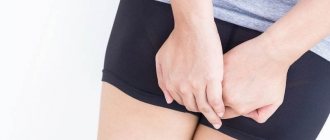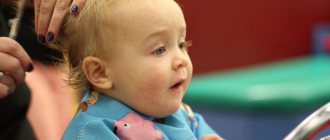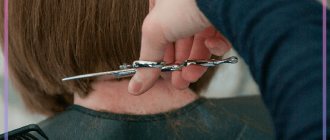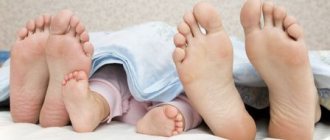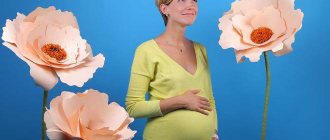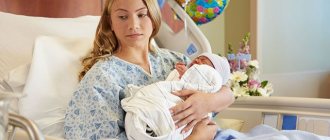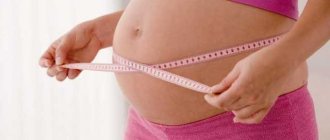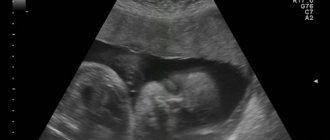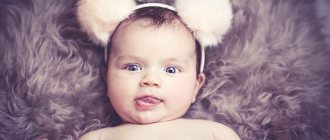How to stop hair loss after childbirth?
7 out of 10 young mothers face the problem of severe hair loss after the birth of their baby. Normally, each person loses up to 100 hairs every day, while for a woman who has recently given birth, their number reaches 500. With fear and melancholy, the fair sex collects lost hair from pillows, collars, and takes them out of the bath after bathing. As a result, they give up and get very upset...
What is the cause of this problem and how to deal with it? Let's figure it out together.
About hormonal changes during pregnancy
During pregnancy, the levels of progesterone and estrogen increase. This happens in geometric progression. These two hormones help improve hair structure and prevent hair loss. They grow well and quite quickly. The action of male sex hormones - testosterone and its derivatives, according to the results of recent studies, on the contrary, increases hair loss. Normally, during pregnancy their levels increase slowly (much slower than progesterone and estrogen). According to my personal observations, hair begins to fall out when a woman is expecting a boy. This is due to the child’s own production of testosterone.
But this is not the only reason why hair loss may occur during pregnancy. Poor nutrition, stress, and exacerbation of chronic diseases can be provoking factors. It is important to take a medical history to decide what to do next.
Choose quality hair care products
The best choice would be restorative shampoos and hair conditioners based on natural ingredients.
To cleanse your hair, we recommend PURE LINE Chamomile hair shampoo for restoring dry and damaged hair with the [PHYTOKERATIN] .
A special shampoo formula with the addition of chamomile extract and burdock oil provides comprehensive care for hair and scalp, restores it along its entire length and prevents hair loss, making hair soft and smooth.
It is best to supplement the shampoo with PURE LINE Chamomile conditioner for dry and damaged hair.
About scalp serums
Before using any new product, read the list of contraindications. During pregnancy, it is prohibited to use products containing hormones and minoxidil. This applies not only to scalp serums, but also to face creams, shampoos, tonics, and facial washes. Hormones can affect fetal development. Minoxidil is a drug used in the treatment of alopecia. It has vasodilatory properties and acts as a receptor agonist (a chemical compound that changes its state and promotes its biological response). Minoxidil can cause a sharp drop in blood pressure, impairing blood circulation.
In my practice, I use the DermaSave line to treat hair loss in pregnant women. She has no contraindications, and the result is good.
Why does Pregnoton Mama help with hair loss after childbirth?
Pregnoton Mama contains a high dosage of biotin, zinc and selenium, which strengthen hair follicles and stimulate hair growth. It also contains folic acid, which promotes more intensive cell renewal, and iron, which improves blood circulation.
Regular use of Pregnoton Mom during breastfeeding will not only help you cope with hair loss, but will improve your well-being, restore your body after childbirth, and give you strength to take care of your baby. Taking the complex will also have a beneficial effect on the development of the child, since beneficial substances will enter breast milk, and with it, the baby.
THIS IS NOT AN ADVERTISING. THE MATERIAL WAS PREPARED WITH THE PARTICIPATION OF EXPERTS.
About hair loss during lactation
During lactation, the level of female sex hormones decreases.
Changes in hormonal levels create favorable conditions for hair loss. The daily rate of “losses” during this period increases three to four times.
There is no need to sound the alarm. This condition is normal. The loss may last 8-9 months. You should contact a trichologist after crossing the specified time frame. There can be many reasons why the process did not complete. One of them is increased prolactin levels.
Some of my patients are very impatient - they come to me 3-4 months after giving birth and ask me to stop the process of loss. They can be offered a safe step-by-step system: peeling - cleanses the scalp of dead cells (their appearance is promoted by growth hormone), stimulating lotion based on Dixidox. This is an absolutely safe substance that has no contraindications for use either during pregnancy or breastfeeding.
Why does hair fall out after childbirth?
Hair loss is a natural phenomenon. Every person loses from fifty to one hundred hairs a day. In ordinary life, with various diseases, as well as after taking certain medications, their loss can noticeably increase. After childbirth, hair loss most often occurs for other reasons:
- Hormonal changes. During pregnancy, after the birth of a child, hormonal changes occur in a woman’s body. Hair follicles are very sensitive to the action of hormones, which is why they immediately respond to hormonal changes.
- Stressful situations. Childbirth, especially the first, is stressful for a woman. The usual measured life remains a thing of the past, and the burden of responsibility for a child often leads to increased anxiety and stress. Lack of sleep and chronic fatigue also negatively affect hair follicles. The roots weaken, but if stressful situations are isolated, they quickly recover. But with constant stress, severe hair loss begins.
- Lack of nutrients. During pregnancy and breastfeeding, the mother “gives” all the beneficial substances to the child, often experiencing a deficiency in them herself. Lack of protein, vitamins biotin, retinol, vitamin E, iron and zinc inevitably leads to weakened hair.
If your hair is falling out a lot after giving birth, don't worry. Over time, after breastfeeding ends, the situation will change. However, if you don't want to wait until things get back to normal on their own, here are some helpful tips.
About hormone tests during the postpartum period
Testing for hormones should be taken seriously. You can't go and do it whenever you feel like it. Some hormones are released on days 3-4 of the menstrual cycle, some on days 9-11. Otherwise, the result may be unreliable. Consult with a clinic specialist before taking the test. The choice of the appropriate time also depends on the reagents with which medical centers work.
About physiotherapeutic procedures after pregnancy
I really love ozone therapy. Exposure to highly active oxygen stimulates blood circulation and metabolic processes in hair follicles, helps reduce itching (often observed after pregnancy!), and kills fungi and pathogenic bacteria. During the procedure, a special cap is placed on the patient’s head, under which ozone is applied. Duration – 15-20 minutes. During this time, tissue oxygenation occurs and redox processes accelerate. Hair begins to grow more actively.
At home, it is permissible to use Darsonval - start with 3 minutes, gradually increasing the time to 10. But I do not recommend using this device for very severe hair loss.
They are already stressed, and additional exposure can increase it. Get the exact opposite effect - hair will begin to fall out even more actively.
Other causes of hair loss
After childbirth, a number of factors begin to affect the curls, which can cause true alopecia (baldness):
• Anemia. During pregnancy, up to 60% of women experience a decrease in the level of hemoglobin, the protein that supplies cells with oxygen. Without oxygen, hair follicles go into a state of rest (telogen), when the hair located in it begins to be rejected. Iron deficiency is aggravated by childbirth, when blood loss occurs, often very serious, which causes thinning of the hair. • Effect of anesthesia and drugs. When a baby is born by caesarean section, general anesthesia is sometimes used. The body artificially goes into sleep when blood pressure drops, blood flow throughout the body slows down, and the pulse decreases. The hair follicles stop receiving full oxygen and nutrients, but toxic breakdown products of drugs and medications enter the bloodstream, which injures the follicle. • Lack of nutrients. It happens that doctors recommend that a nursing mother adhere to a strict diet, which is why her diet is poor in proteins, polyunsaturated fatty acids, valuable minerals and vitamins. At the same time, during lactation, saturation of milk with all useful substances becomes a priority task for the body. Therefore, he will take all the missing elements from his own resources, and the hair follicles, as organs that do not have life-supporting value, will receive nothing. • Stressful condition. In the first months of his life, mother and baby experience great stress: the rhythm of life has completely changed, there is fear for the baby, and worries about her own body, which has become like someone else’s. Over time, the body will adapt and return to normal, but heavy doses of cortisol and adrenaline will slow down the work of the follicles and cause another increase in hair loss. • Extreme fatigue. It’s a rare mother who has the opportunity to get enough sleep, relax and playfully cope with everyday difficulties. All this leads to the fact that the body functions at the limit of its capabilities, does not have time to recover and its reserves are not enough to produce healthy hair. • Lack of time for self-care. The young mother stops carefully monitoring whether she is injuring her curls. More and more often, she pulls them into a ponytail, combs them wet, and even goes to bed with a wet head, and stops using hair balms and masks. Sometimes, after the birth of a child, a family’s income level decreases significantly, or simply due to inattention, a woman begins to buy and use low-quality cosmetics.
Important! After giving birth, your hair should return to its normal state in about 8–12 months. This period is individual for each woman, and traumatic factors have a negative impact on its duration. If the process of hair thinning lasts longer than a year, this may threaten baldness and does not require resorting to “folk remedies”, but a mandatory consultation with a doctor.
When to sound the alarm?
While the body performs the function of bearing a child, all processes in it are subordinated to this goal. Sometimes it happens that a powerful change in hormonal levels leads to disruption of the endocrine system, which in turn affects the growth of curls: they fall out, become weak and thin. Such failures do not go away on their own and require medication correction.
What are the symptoms of endocrine disorders?
• Increased blood pressure. • Frequent headaches, dizziness. • Swelling. • Increased oily skin, acne. • Excess weight or excessive thinness. • The appearance of heavy hair on the body: on the chin and above the upper lip, around the nipples, on the chest, lower back, thighs, buttocks. Unfortunately, during pregnancy, autoimmune diseases can also become more active, which leads to a blockage of the hair follicles, and a genetic predisposition to baldness can also be triggered.
If you have severe hair loss and the above symptoms, you should undergo a full medical examination. Consultations with a gynecologist and endocrinologist are required. After collecting the medical history, the doctor will direct the patient to take a blood test for hormones. What indicators are especially important for correcting the condition of curls?
• Testosterone. • Androstenedione. • Thyroid hormones. • Prolactin.
Only after a thorough examination will the doctor prescribe specific medications. Buying any medications at the pharmacy and taking them yourself is strictly prohibited - you can seriously aggravate the problem.
Important! The only thing you can do on your own to improve the condition of your hair in case of hormonal imbalance is to lose weight. Physical activity and a healthy diet will benefit both your figure and hair. According to research, even approaching a normal body mass index makes the hair follicle stronger by almost a third. Hair care during the postpartum period
It is possible and necessary to take care of thinning strands after the birth of a child. If the problem is related to health problems, your doctor will tell you about ways to care. But even if there is no medical problem, and your head is simply leaving something that should have left it anyway, taking good care of your curls will make your hair truly healthy and attractive.
In order for the fight against hair loss to bear fruit, a set of measures is necessary.
1. First of all, it is necessary to reduce the load on weakened hair follicles, i.e., get a haircut. In the first months after childbirth, some women's curls still remain unruly, so a casual, multi-level haircut like a pixie or cascade would be a good choice. In addition, this hairstyle is easy to care for, it does not require long and complicated styling and always looks stylish.
Attention! Make an appointment with a specialist in advance so as not to waste time waiting in line, or call a specialist at your home.
2. Switch to high-quality sulfate-free cosmetics and organic hair care products. Make sure that the composition does not contain sulfates, silicones and parabens, but contains herbal complexes against hair loss, natural growth stimulants, hydrolyzed keratin, and other natural ingredients.
Attention! Which series of shampoo and conditioner should you choose to care for your hair during the postpartum period? Give preference to restorative products for damaged and weakened hair.
3. Be sure to use reconstructive, moisturizing and nourishing masks at least once a week. Pay attention to masks containing oils, oil solutions of vitamins A and E, as well as oils in their pure form.
Attention! There are many recipes on the Internet for homemade masks for hair restoration and growth, but you need to take into account that they require a significant amount of time to prepare and are not suitable for comfortable application or rinsing. The finished product is much more convenient for a young mother.
4. Use scalp peels once a week. The products effectively remove residual impurities, dead skin cells of the epidermis, and perform micromassage of the skin, which improves tissue trophism and the absorption of nutrients and caring components from cosmetics.
Attention! When deciding to use homemade scrubs, for example, table or sea salt, be careful - choose a finely ground product and do not massage the skin too actively, otherwise you can injure both it and the hair follicles.
5. Every day, morning and evening, perform self-massage of the scalp and collar area. Gently comb your hair in different directions for 5-10 minutes, then gently massage your head with your fingertips. Massage improves blood flow by stimulating the hair follicles.
Attention! The massage procedure can be performed using various devices: electric massage brushes, massagers, applicators, etc.
6. Treat your curls with care. Choose a comb that will gently untangle the strands without damaging them: a wooden comb, teaser combs, brushes with natural bristles, etc. During and after washing, do not rub your hair, do not roll it into plaits, do not comb or braid it while wet. Avoid using thermal appliances.
Attention! If the quality of the length after pregnancy has not been affected, coloring and permanent waving can be done, since chemical reagents do not affect the scalp. Otherwise, the procedures will aggravate the problem to the point of breaking off the strands.
Good nutrition is a panacea for hair loss!
A proper diet after childbirth, rich in proteins, polyunsaturated fats, microelements and vitamins, is the best remedy for baldness and brittle hair.
What should a young mother eat to keep her hair thick?
• First, you should adjust your diet - that is, eat 3-4 times a day. For many young mothers this is problematic. Think about what routines in your baby’s life can you link your snacks with? It is best to feed yourself before or immediately after the baby has eaten, or eat with him. Some people tie meals to the time of the baby’s naps, or moments when he is in a good mood and can occupy himself: usually 15–20 minutes. several times a day. • It is difficult for a young mother to find time to prepare various dishes for breakfast, lunch and dinner. But a healthy diet does not require this at all! The necessary protein and healthy fats can be obtained from ready-made products: cottage cheese, cheese, yogurt, fermented baked milk, sour cream, etc. Some protein products require minimal and labor-intensive heat treatment: for example, you can boil and cut into portions meat, eggs, and fish. Vegetables and fruits are even healthier to eat raw. • It is necessary to monitor the ratio of proteins-fat-carbohydrates in the diet, and also consume enough fiber, chlorophyll, vitamins and microelements. The easiest way is to pay attention to the contents of your plate at each meal: let there be a third of protein foods, a third of carbohydrates, and a third of vegetables, including leafy ones. Snack on fruit twice a day. At night, drink a glass of fermented milk drink (kefir, yogurt, fermented baked milk, etc.). • If, for various reasons, your diet is significantly reduced in the last months of pregnancy and the postpartum period, consult your doctor and take dietary supplements, as well as multivitamins. Today there is a large selection of special complexes for nursing that will replenish the deficiency of bioactive substances in the body. • Avoid eating unhealthy foods: smoked, fried, pickled, salty, sweets, carbonated drinks, alcohol. All these products have a bad effect on metabolism, change the properties of proteins that make up skin and hair cells, and block the functioning of hair follicles.
Important! Proper nutrition is optimal both for hair thickness and for maintaining the health of nursing mothers and their babies. in any particular way , in addition to giving up obvious harmful foods, for a nursing mother - La Leche League specialists have long proven that a mother’s strict diet does not have any effect on the occurrence of colic in a baby or the occurrence of dysbacteriosis.
General rules
• Establish a rest routine. To restore the normal functioning of hair follicles, full sleep is necessary: at this time, metabolism, the functioning of the immune system, and hormonal levels are normalized. When your baby falls asleep, sleep with him, rather than rushing to wash windows or vacuum rooms. • Delegate some of your household chores: you need to reduce the load on your body to give it the opportunity to recover. Ask your mother, friend, husband for help, thank you generously for their support. If there are no helpers, lower the bar for your own claims to the beauty and comfort of your own home. • Get rid of stress. Don’t worry about colic, the baby’s first colds, or any discrepancies between his skills and generally accepted standards - most often, all these are temporary sorrows that will pass without a trace in just a couple of months.
Don't expect quick results: with proper care and nutrition, your hair will reveal its full potential only a couple of years after giving birth. However, if you act correctly and systematically, every next day will make your curls more beautiful, healthier and stronger.
About nutrition
There are many more nuances in nutrition than it seems. The diet must contain animal protein, polyunsaturated fatty acids, micro- and macronutrients. But during breastfeeding, a woman follows a special diet - some foods that cause allergies in children are strictly prohibited. Here you need to focus not on the condition of the hair, but on the well-being of the child.
Alena Panova
Cosmetic trichologist
How to strengthen hair after childbirth?
To get rid of hair loss after childbirth, you need to act in several directions at once. Following simple recommendations will restore strength and shine to your hair.
Masks and serums
The effect of all masks and serums is to increase blood circulation in the scalp, where the bulbs are located, so that more nutrients flow to them and the bulbs “wake up”.
To strengthen the roots, you can use grandmother’s proven recipes. A mask of egg yolk and honey is a good remedy for restoring hair follicles. It should be applied twenty minutes before washing your hair, and after the time has elapsed, simply rinse with shampoo.
Rye bread has an excellent strengthening effect. It is rich in B vitamins, which your hair needs. The bread is soaked in warm water or a decoction of burdock roots, and the resulting pulp is rubbed into the scalp fifteen minutes before washing.
Today you can use not only your grandmother’s recipes, but also ready-made masks and serums to stimulate hair growth. Manufacturers offer a large number of medicinal cosmetics for this purpose. The main thing is to pay attention to the composition of the product and its safety. Not all therapeutic masks can be used during feeding. You should also not communicate with your child, much less breastfeed him, while the mask is on your hair.
Nutrition
Hair is formed inside a hair follicle, and like any other new cells, it requires “building material” in order to grow. In order for hair to be strong and healthy, a woman’s diet must be complete and varied. Fasting and dieting always have a negative impact on hair condition. It is important that the food is rich in protein (especially collagen). Low-fat food will also have a bad effect on the condition of your hair.
Not only protein foods, but also dishes high in polyunsaturated fats will help strengthen hair after childbirth. These include: sea fish, seafood, nuts, eggs, lean meat, fresh vegetables, dairy products. A varied, balanced diet is the key to healthy and strong hair.
Vitamins and minerals
Lack of vitamins and microelements is another major cause of hair loss. Hair follicles are one of the first to react to a lack of nutrients. First of all, hair growth requires zinc and biotin, as well as selenium, B vitamins, vitamins D and E. Therefore, taking vitamin-mineral complexes will help restore hair growth. When choosing a complex, pay attention to whether it is allowed during breastfeeding, or better yet, immediately choose a special vitamin and mineral one for nursing women. For example, Pregnoton Mama.
About hair care during the postpartum period
Some professional products are prohibited for pregnant and lactating women. This information must be indicated on the packaging - pay attention. Many people practice Botox and lamination after childbirth. Do not do this. Formaldehyde is often found in Botox - it is very toxic. There are formulations that do not contain harmful substances. If this is the case, the manufacturer will definitely tell you about it.
Lamination compositions often use active stimulating components. For example, menthol can irritate the scalp.
About vitamins after pregnancy
In any case, and even more so if you are breastfeeding, take vitamins. Feel free to choose the drug prescribed by the doctor in the second half of pregnancy. Take until the end of the lactation period, or even better, within six months after that. You take vitamins not for the child, but for yourself! In any case, the baby will take everything he needs, even if the mother has a deficiency of some vitamins, micro- or macroelements. But your bones and joints may suffer.
About homemade masks against hair loss during the postpartum period
There is no point in using homemade masks either during pregnancy or after. Kefir, eggs and others like them provide not a healing, but a conditioning effect. We live in the 21st century! Conditioners and masks have been around for a long time. Why suffer?
In homemade masks, the molecules are too large to pass through the epidermal barrier or under the hair scales. Everyone who came to me after using non-cosmetic oils had the same picture: dryness, brittleness, confusion.
They act like a film, covering the hair and preventing nutrients from penetrating.
About skincare products
When choosing care products after pregnancy, you need to focus on the condition of your hair.
What suits porous ones will not affect the condition of smooth ones. And vice versa. There is a basic test that can be done at home. Tear off a hair and place it in a glass of water. If it sank to the bottom - the hair is porous, stopped in the middle - the hair is medium porous, remained on the surface - the hair is healthy and smooth. I use a trichoscope and visual inspection in my work. Interview and text: Natalia Kapitsa
